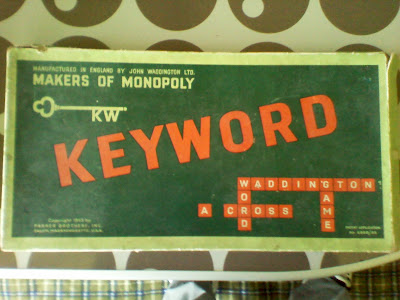If this looks like a cynical attempt by Parker Brothers' to, ha ha, beat Spear at their own game, then you're probably right.
After all, the copyright date on the box above is 1953 - the year when Scrabble became a household name.
But there are enough differences in here to make Keyword a little more than merely derivative. Sure, there are 96 tiles instead of 100, they're white on black instead of black on white, and you hold ten of them in your rack instead of seven, but wait there's more.
The double letter squares are grouped into player-specific zones on the board, coordinated by the colour of your rack. There are cards for bonus sequences of letters. The way that I read the rules, two letter words are not allowed.
Probably Keyword's biggest difference with Scrabble though is that all the tiles are worth the same score of five points. When John, Hastings and I played this this afternoon, I for one quickly felt a sense of accomplishment at breaking 100 so quickly… and I spent the entire game in last place!
The real downer of this equality of tiles though, is that there is no reward for playing an unusual letter. For example, in Scrabble the benefit of getting landed with the dreaded Q is that you might be able to make a killing with it. Not so here, and much less sense of pride at getting it out too.
It was also a much quicker game. I suppose this ought to make it more playable.
The vagueness of the instructions suggests that it hadn't been test-run much before manufacture.
Ultimately I found this more reminiscent of Junior Scrabble than Scabble itself, and perhaps kids were indeed its intended market.
The bottom line though has got to be that E pays the same as X, so practising and learning all those unusual words doesn't reward you as much.
Would it be too square of me to say that this game isn't as much fun if you're not learning?
After all, growth is a great motivator.
Labels: activities





 :)
:)

 Brett
Brett Random Dave
Random Dave Scottish Dave
Scottish Dave Frank
Frank Greg
Greg Herschel
Herschel Jacob
Jacob Jean
Jean Joe
Joe Jonathan
Jonathan Melissa
Melissa Melva
Melva Paul
Paul The Reynolds
The Reynolds Rhett
Rhett Sara
Sara Sarah
Sarah Tim
Tim My church
My church
0 comment(s):
Post a Comment
<< Back to Steve's home page